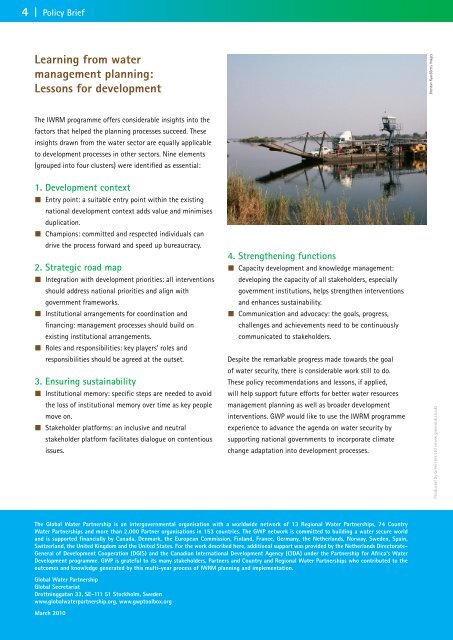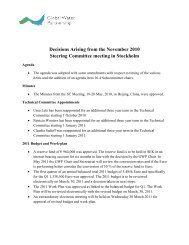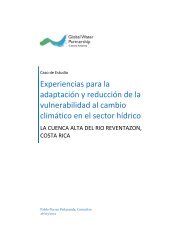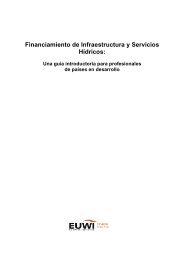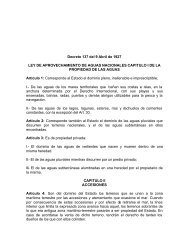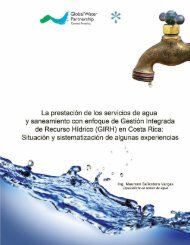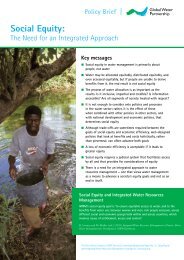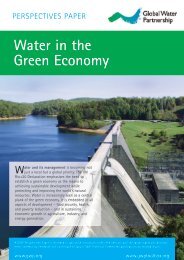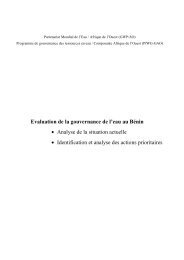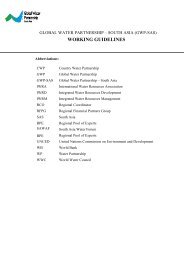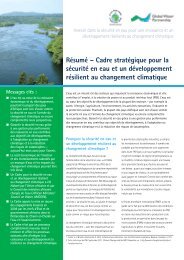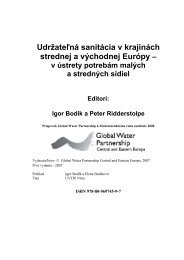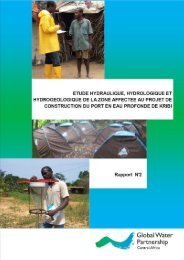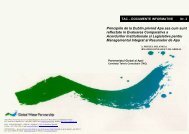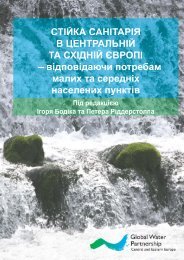Policy Brief - Global Water Partnership
Policy Brief - Global Water Partnership
Policy Brief - Global Water Partnership
Create successful ePaper yourself
Turn your PDF publications into a flip-book with our unique Google optimized e-Paper software.
4 | <strong>Policy</strong> <strong>Brief</strong>Learning from watermanagement planning:Lessons for developmentBrendan Ryan/Getty ImagesThe IWRM programme offers considerable insights into thefactors that helped the planning processes succeed. Theseinsights drawn from the water sector are equally applicableto development processes in other sectors. Nine elements(grouped into four clusters) were identified as essential:1. Development context• Entry point: a suitable entry point within the existingnational development context adds value and minimisesduplication.• Champions: committed and respected individuals candrive the process forward and speed up bureaucracy.2. Strategic road map• Integration with development priorities: all interventionsshould address national priorities and align withgovernment frameworks.• Institutional arrangements for coordination andfinancing: management processes should build onexisting institutional arrangements.• Roles and responsibilities: key players’ roles andresponsibilities should be agreed at the outset.3. Ensuring sustainability• Institutional memory: specific steps are needed to avoidthe loss of institutional memory over time as key peoplemove on.• Stakeholder platforms: an inclusive and neutralstakeholder platform facilitates dialogue on contentiousissues.4. Strengthening functions• Capacity development and knowledge management:developing the capacity of all stakeholders, especiallygovernment institutions, helps strengthen interventionsand enhances sustainability.• Communication and advocacy: the goals, progress,challenges and achievements need to be continuouslycommunicated to stakeholders.Despite the remarkable progress made towards the goalof water security, there is considerable work still to do.These policy recommendations and lessons, if applied,will help support future efforts for better water resourcesmanagement planning as well as broader developmentinterventions. GWP would like to use the IWRM programmeexperience to advance the agenda on water security bysupporting national governments to incorporate climatechange adaptation into development processes.Produced by Green Ink Ltd (www.greenink.co.uk)The <strong>Global</strong> <strong>Water</strong> <strong>Partnership</strong> is an intergovernmental organisation with a worldwide network of 13 Regional <strong>Water</strong> <strong>Partnership</strong>s, 74 Country<strong>Water</strong> <strong>Partnership</strong>s and more than 2,000 Partner organisations in 153 countries. The GWP network is committed to building a water secure worldand is supported financially by Canada, Denmark, the European Commission, Finland, France, Germany, the Netherlands, Norway, Sweden, Spain,Switzerland, the United Kingdom and the United States. For the work described here, additional support was provided by the Netherlands Directorate-General of Development Cooperation (DGIS) and the Canadian International Development Agency (CIDA) under the <strong>Partnership</strong> for Africa’s <strong>Water</strong>Development programme. GWP is grateful to its many stakeholders, Partners and Country and Regional <strong>Water</strong> <strong>Partnership</strong>s who contributed to theoutcomes and knowledge generated by this multi-year process of IWRM planning and implementation.<strong>Global</strong> <strong>Water</strong> <strong>Partnership</strong><strong>Global</strong> SecretariatDrottninggatan 33, SE-111 51 Stockholm, Swedenwww.globalwaterpartnership.org, www.gwptoolbox.orgMarch 2010


